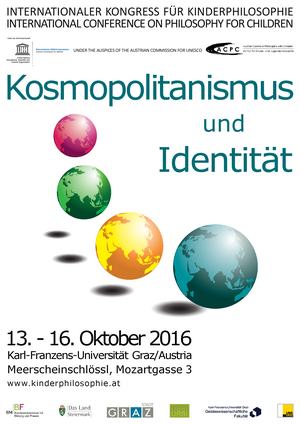International Conference of Philosophy for Children 2016
"Cosmopolitanism and identity"
from 13 - 16 November 2016 in Graz/Austria
Cosmopolitanism - often translated as cosmopolitanism - is based on an idea that goes back to antiquity. The emphasis is on the commonalities of being human. This aspect of cosmopolitanism blossomed during the Age of Enlightenment and took the form of a universalism that gave rise to the Declaration of the Rights of Man in 1789 and Kant's idea of a confederation of nations. "Not only the value of human life, but also the value of each individual life was essential." Kwame Anthony Appiah
Over a long history up to the present day, various cosmopolitan approaches have distinguished between the mere recognition of multidimensional diversity in societies and our moral obligations towards the Other.
At stake is the important renewal of relationships between interculturality, cultural/ethnic identities, interdisciplinarity and transdisciplinarity on the one hand and cultural diversity on the other.

The globally networked world is a reality and presents us with major challenges. This includes finding our bearings in a world of very different lifestyles and values, dealing with processes of globalisation and phenomena such as flight, displacement, migration, mobility and diversity, considering the ecological and social consequences of our own consumption, rethinking traditional ideas about identity, culture and home, reacting flexibly to the demands of the changing world of work and making responsible political decisions, as well as assessing the consequences of our own actions. The context of a globalised world also requires a new, broader perspective in the field of education in order to respond flexibly to social changes across all sectors and to be able to fulfil important contemporary educational tasks. Innovative, sustainable and pedagogical strategies are required that respond to the ever-accelerating processes of economic, political and cultural globalisation and enable young people to develop their own identities.
How can we prepare young people for the globalised world? What knowledge, competences, skills and strategies are needed to work towards a peaceful, fairer society?
An effective pedagogical approach emerges from a philosophical community of inquiry, where children and young people are empowered to use critical, creative and empathetic thinking to develop an understanding of cultural differences, value systems and processes, but where values and ideologies are not imposed. Through philosophising with children and young people, an environment is created in which young people from different cultures can be open and develop their identities, as well as become aware of and learn to appreciate their own and others' potential.
This year's congress is planned as an intercultural forum to enable philosophical discussions on current global phenomena, as well as to build a bridge to other scientific disciplines. An important aim of this event is to initiate an exchange of different approaches and thus make further knowledge bases explicit for both educational concepts and educational policy initiatives.
The topics of the congress will focus on the following areas: